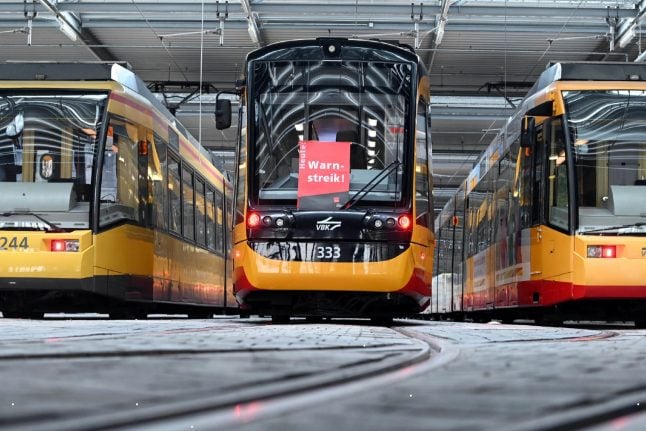The trade union Verdi, which represents 87,000 workers from 130 public transport companies across the country, has called on its workers to strike on Tuesday.
The workers will be taking part in so-called ‘warning strikes’, which are used as a forewarning for strikes in the following days.
U-Bahn trains, buses and trams in cities across Germany will be running at extremely limited capacity or not at all. Some of the cities affected include Cologne, Munich, Hanover, Mainz and Berlin.
Strikes in many regions including Brandenburg and Saxony are expected to last for 24 hours from 3am on Tuesday.
In Berlin, the strike will last from 3am to 12am, according to public transport operator BVG. According to the union, no further public transport strikes are planned this week.
Sorry. Gehört nun mal dazu. pic.twitter.com/IbgviGRft2
— Weil wir dich lieben (@BVG_Kampagne) September 28, 2020
The strikes will not affect S-Bahn services (such as those in Berlin and Munich) or regional trains.
In Berlin, a more regular S-Bahn service will be offered to cope with increased demand. Instead of running between 5.30am and 8.30pm, the S1 and S5 lines will run until 12am.
The trade union believes that discrepancies in wages in different states have grown over the years and is calling for a nationwide standard pay for its workers.
They are also demanding measures to relieve the increasing strain felt by employees during the corona crisis, such as extra leave or special bonuses, as well as policies focussing on the recruitment and development of young workers.
READ ALSO: Explained: What sparked the protest culture of modern Germany?
Their demands have previously been met with rejection from employers.
“After 20 years of austerity, workers are being stretched to breaking point,” said Verdi Vice President Christine Behle on Friday.
“The fact that employers are not even ready to negotiate is an affront to the employees and torpedoes any effort to achieve a change in the status quo.”
Separate strikes in the public sector
These strikes are not linked to the nationwide walkouts of public sector workers seen this week.
READ ALSO: This is where workers around Germany are striking on Tuesday
For over two million public sector workers, Verdi is demanding a 4.8 percent pay rise,, or a minimum of €150 a month in all 16 German states.
The second round of negotiations last weekend were unsuccessful. The third round of negotiations is scheduled for October 22nd and 23rd.



 Please whitelist us to continue reading.
Please whitelist us to continue reading.
Member comments